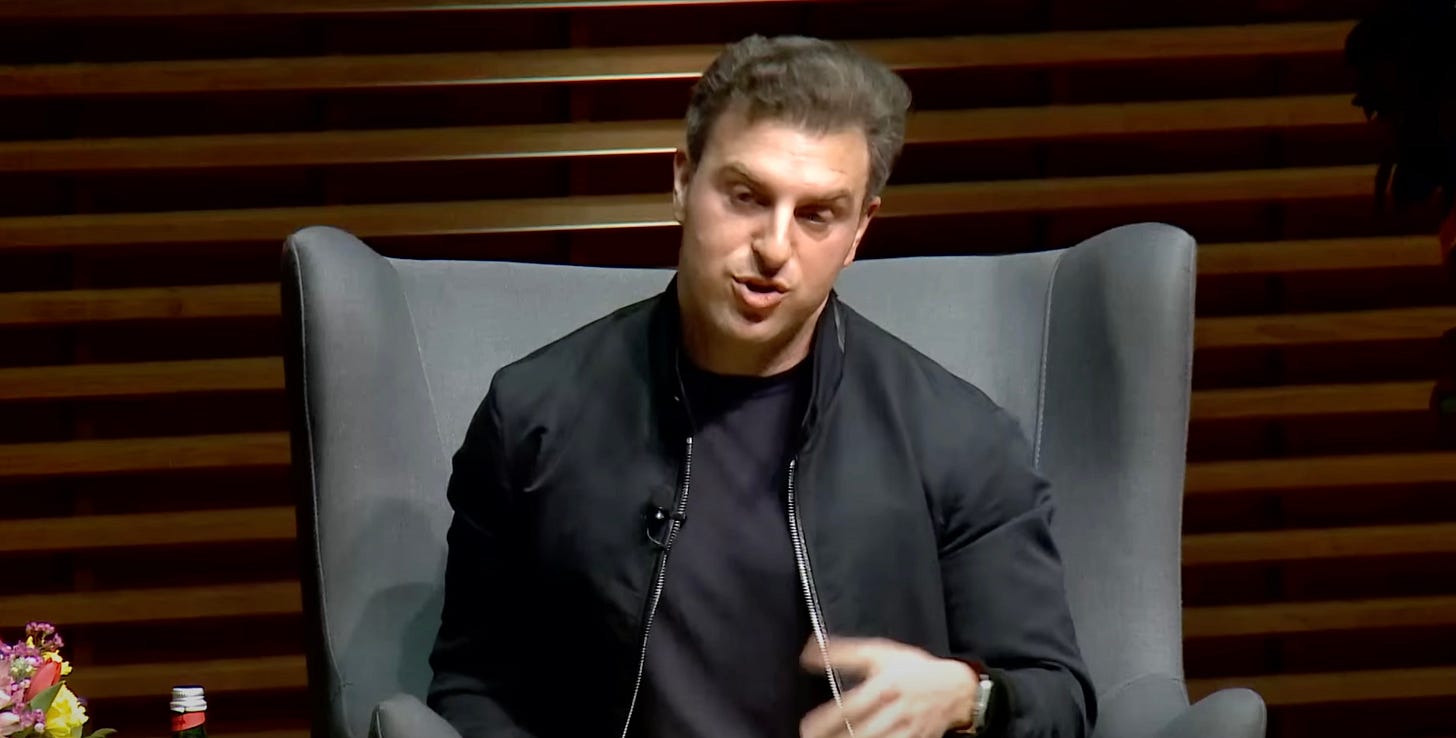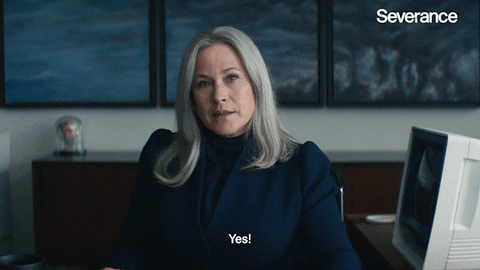How’d You Like To Work At Airbnb Until You Die Or Run Out Of Bricks, Whichever Comes First?
That’s apparently an interview question.
The Startup Archive, which “curates” advice from startup founders and investors, posted a clip from an interview with Airbnb founder Brian Chesky. Airbnb’s stated mission is “[creating] a world where anyone can belong anywhere.” In reality, this has resulted in people feeling like they no longer belong in their own neighborhoods.
Corporations often co-opt the term “mission” as if they’re a non-profit organization that places orphaned kittens with loving families. In this clip, Chesky explains how he looks for employees who will promote Airbnb’s “mission” — merry corporate soldiers for his bottom line.
“We don’t want people here because they think we’ve got a great valuation, they like our office design, they need a job, or they think it’s hot,” he said. “We want people to be here for the one thing that will never change, and that’s our mission … And you champion the mission by living the mission. Do you believe in it? Do you have stories about it? Have you used the product? Would you bleed for the product?”
I’d bleed for my loved ones and my community. I’m not shedding blood for anything that has a market share. This sounds like a cult. It reminds me of companies that would expect employees to “evangelize” its product offering. The Stormtroopers from Star Wars probably receive a similar pep talk during orientation. Although, perhaps a more apt pop culture comparison is the TV series Severance, where the corporate culture is indistinguishable from a cult. Severance depicted the ultimate work/life balance — employees willingly “severed” their personal and professional personas, effectively enslaving a part of themselves within a corporate plantation. The employees at Lumon Industries toil in service to its long-dead founder, Kier Eagan. They live and breathe the Eagan mission — “Praise Kier!” — because they no longer have any choice.
Baltimore Banner columnist Leslie Gray Streeter offered a searing response to Chesky’s remarks.
“Anyone who wants you to have passion for their business which will make them millions and you far less, wants you to support their dreams and doesn’t care about yours,” she posted on Threads. “Your fortune is not my calling.”
I recall corporate job postings that sought employees willing to work in a “fast-paced startup environment,” one that’s guaranteed to tank your personal relationships and eventually crush your spirit. The kicker is that these were established companies and not actual startups. There’s no big payout waiting for you in the future. The company just wants everything you’ve got and in return they’ll pay you reasonably well until the next round of layoffs.
Airbnb laid off 25 percent of its workforce in May 2020 when the coronavirus pandemic devastated the travel industry. That’s not Chesky’s fault, but it’s also why you shouldn’t surrender your entire life to a business.
The Work/Death Balance
Chesky apparently asked Airbnb’s first 300 employees the same interview question: “If you had a year left to live, would you take this job?”
He admits that it’s probably a bad idea to hire people so pathetic they’d rather work for Gentrification Incorporated than spend their last year above ground with their families.
“So I amended it to 10 years,” Chesky said. “If you knew you had 10 years left to live — whatever you would want to do in those last 10 years, you should just do. And I really wanted people to think about that. That was enough time to do something you really cared about … And the answer doesn’t have to be this company. If what you’re meant to do is travel or start a company, you should just do that.”
It’s revealing that Chesky imagines that “something you really cared about” doing in your final decade of life is either traveling or starting a business. I personally love to travel but I wonder if Chesky’s version is just more checkbox mentality: It’s less about experiences than achievements. He probably has Everest on his “bucket list.”
Amending the question to 10 years is arguably more sinister. Potential employees would probably view that hypothetical final year with more urgency. However, it’s very tempting to think about using nine of those 10 years to earn more money and then go out in style, and that’s the entire corporate life trap in a microcosm. Too many of us sacrifice, scrimp, and save for an imagined future when we might actually enjoy our lives. Chesky would have you squander those remaining years working for him with the promise that you can reclaim your life at some later date. However, during that time, when you’re fueling someone else’s “passion,” you’ve missed seeing your kids grow up or connecting with your larger community.
A few years ago, I was working on a play in Seattle, and we’d hoped to cast a very talented woman in one of the lead roles. She worked for Local Tech Giant, and she’d originally thought this was a great arrangement: She could afford to live comfortably in the city, and she could pursue her passions on her off hours — except Local Tech Giant didn’t allow her any “off hours.” She had to turn down the part because Local Tech Giant wouldn’t guarantee that she could show up at the theatre by 7 p.m. four days a week, two of which were Saturday and Sunday! This wasn’t forever, either. It was just three months.
Chesky — like Local Tech Giant — believes his employees shouldn’t do anything they really care about while also working for him. He doesn’t want everything. He wants it all. This attitude isn’t exclusive to corporate executives, either. Unfortunately, it’s become far more widespread. Distrust anyone who describes their business, even the most humble mom and pop, as a “family.” You have enough trouble with your own family. A professional one is even more dysfunctional.
“Two men are laying bricks,” Chesky said, loosely quoting an old parable. “Somebody comes up to the first man and asks, ‘What are you doing?’ He says, ‘I’m building a wall.’ He then asks the other man who says, ‘I’m building a cathedral.’ There is a job, and then there is a calling. We want to hire people who aren’t just looking for jobs. They’re looking for a calling.”
Look, Airbnb isn’t some noble enterprise. It hasn’t saved lives or blazed the path toward a brighter tomorrow. It’s a business.
I admit that when I was younger, I believed whatever I achieved professionally would define my life and perhaps justify my existence. I shared the same consuming ambition as Boy Willie from August Wilson’s The Piano Lesson:
“I was born to a time of fire. The world ain’t wanted no part of me. I could see that since I was about seven. The world say it’s better off without me … So what I got to do? I got to mark my passing on the road. Just like you write on a tree, ‘Boy Willie was here.’”
I thought a “calling” would elevate me, but I’ve come to realize that everyone has a calling. The life we lead is our unique mission. A job is just how we earn a living, and employers can’t demand our lives as compensation for that job.
The original parable Chesky mentioned actually involves three men. Chesky probably had to let one of them go. Anyway, after the great fire in London, architect Christopher Wren had the task of rebuilding St. Paul’s Cathedral. One day, the story goes, he observed three bricklayers on a scaffold. He asked each of them, “What are you doing?” Instead of shouting, “We’re laying bricks, you dullard!” they played along.
The first bricklayer replied, “I am a bricklayer. I work hard laying bricks to feed my family.”
The second bricklayer replied, “I am a builder. I’m building a wall.”
But the third bricklayer, the most productive of the three, when asked, “What are you doing?” replied with a twinkle in his eye, “I am a cathedral builder. I am building a great cathedral to the Almighty.”
The third bricklayer was clearly deranged, but we’re expected to believe his delusions made him more productive. A company’s favorite employee has ownership in the business but without an actual bill of sale.
Chesky is worth an estimated $10 billion. His bricklayers have helped him construct a cathedral that he owns and controls. If a billionaire CEO has committed his entire body and soul to his ambitions, that’s literally his business. Airbnb salaries range from $70,000 for the photographer who takes pictures of the rental with the dead body just out of frame to about $850,000 for the highest-paid software engineer. Their total commitment is apparently valued at barely a fraction of Chesky’s. That’s capitalism for you, but while Chesky might own those bricks, he doesn’t own us.
Follow Stephen Robinson on Bluesky and Threads.
Subscribe to his YouTube channel for more fun content.





I used to teach high school English. For 17 years. I was really dedicated to it and although the pay was crap and I spent most of my evenings and all my weekends grading and prepping, it was really fulfilling to see those kids work, succeed, and go off to college better prepared. But I was exhausted all the time. And then I was just too exhausted to care anymore.
Now I work in a research library and the whole ethos is, when you leave at 5, you're done. On weekends, don't read your email. Please take a long walk at lunch so you can re-focus. If you need to move your folks into Assisted Living, please go do it; we'll cover for you. If your kid is sick, go take care of her. I'm 61 now and I can see doing this until I am well past 70, because these people actually care about my mental and physical health and in return they are getting a lot of loyalty.
Lordy, these corporate captains of industry are soulless, narcissistic, selfish monsters. If they want people to love (nay, even simply "like") working for them, then they need to do the work to make their company a welcoming, nurturing, rewarding place. The expectation that we wage slaves should happily toil for the master not for rewards but simply for their exclusive benefit is just gross. But more than gross, it's sociopathic.